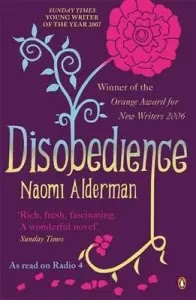Naomi Alderman's "The Power"
'The Power' by Naomi Alderman was one of the books that kept popping up on lots of end-of-year book lists last month, so it got bumped up my TBR list as one of my not-so-festive Christmas holiday reads. The central theme of Alderman's fourth novel is what would or could happen if women became more powerful than men in every way. Teenage girls develop the ability to release electrical jolts through their fingertips as a result of a mutation caused by a nerve agent used during WWII, which can be either harmless or lethal. Although the "power" is initially used by women as a deterrent against violent and abusive men who have oppressed them, it has far-reaching implications beyond that.
The plot revolves around four main characters: Roxy Monke, the daughter of a London gangster, Allie Montgomery-Taylor, later known as Mother Eve, US politician Margot Cleary, and Nigerian journalist Tunde. Each protagonist's individual journey addresses the global consequences of "power" in terms of crime, religion, politics, and the media. What appears to be a story about revolution and liberation soon devolves into something far more sinister. 'The Power' is a book that forces you to look at everything upside down and backwards. Men are afraid to walk alone at night, the Holy Father transforms into the Holy Mother, and women are viewed as physically intimidating while holding the vast majority of political and military leadership positions. It asks the reader to consider whether power is wielded differently depending on who wields it and how gender is framed in various contexts. Finally, Alderman's message is simple: power corrupts, and absolute power corrupts completely. Rather than creating a society in which men and women have equal rights, roles, and responsibilities, Alderman's dystopian vision depicts women abusing their power in the same way that men did, with disastrous results.
XEM THÊM :
Hướng dẫn ⚡️ Chơi tiến lên đếm lá online ⚡️ hiệu quả
In addition to graphic violence, Alderman addresses the subtle condescension with which women treat men, an aspect which she explores very effectively in the exchange of letters between a male author and a female editor at the beginning and end of the book.
It's no surprise that Alderman was mentored by Margaret Atwood and that 'The Power' has been compared favorably to 'The Handmaid's Tale.' It is regarded as one of the best works of speculative fiction because it casts a harsh light on the world as it currently exists by presenting a future full of unsettling possibilities and raising important and timely questions about oppression, violence, and corruption.
READ ARTICLES:

.jpg)


Comments
Post a Comment